Silence Review
The Last Samaritan
Released : January 1st 2017
Certificate : 15
Director : Martin Scorsese
Cast : Andrew Garfield, Adam Driver, Yōsuke Kubozuka, Tadanobu Asano, Issey Ogata, Liam Neeson
Plot : Two Jesuit priests travel to Japan to find their mentor who apparently has renounced his faith after persecution.
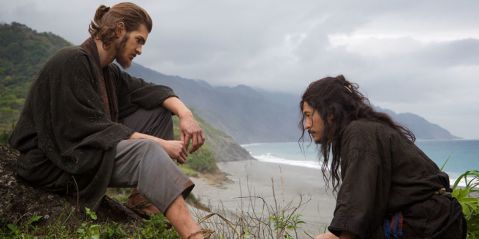
Scorsese follows is most humorous and ludicrous films with his long-desired project Silence, a film that he has desired to make for thirty years now. This being his third film that deals with faith, he re-joins with frequent collaborator Michael Ballhaus and relative newcomer Rodrigo Prieto, both cinematographers, to ensure that if nothing else this biblical epic is one of the best-looking films of the award season. And speaking of awards season, Andrew Garfield stars in Silence, making him a lead role in two of this year’s award tipped films.
Silence is a true epic, in both runtime, semantic scope and technical mastery of its creation. To deal with the second feature, the film obvious deals with the deeper questions of God’s silence, what is means to betray him and general religious philosophy. What was a surprise, was the character drama on show here. While it was to be expected that Garfield and Driver’s character carry the weight of the drama via their character arcs, the supporting casts performance and their scene with our two leads were outstanding. The film contains an abundance of brilliantly scripted set character interaction of brilliant quality. These scenes added much to the film as they developed the character of the oppressed and the oppressors of Japan at the time. This gave a great level of humanity to all the characters allowing for a story much less black and white then; Christianity is goodness and all else is wrong.
Dealing with Scorsese work, for those who appreciate the subtle methods of direction that convey meaning, this is the wrong film. As Scorsese techniques and bold and striking when telling this tale. Initial high bird’s eye view shots create the sense of a God like over watch, and the wide-angle shots of Japan show the immense magnitude of our lead character’s task. Not that these or any other of the shot choices within the film are bad, On the contrary the delivered the story excellently, in the third act a reliance on POV shots from Garfield’s character really build the atmosphere. However, for such as intruding topic and story it was just missing the presentational edge that other Scorsese films had. But when you’re dealing with Scorsese there is always a certain level of excellence, the opening scene one of the most strikingly well shot scenes openings of recent memory.
The opening scene also shows off some of the acting from the well-known trio of actors that star in the film. With Neeson having largely retreated into action roles, it is easy to forget his skill, and he’s actualisation of grief within this film is so real. Grief being a key emotion that all three actors have to deal with, and Garfield does so excellently. Garfield being an actor that can manipulate his voice very well to convey emotions, as for his eyes, which convey so much. Apart from a single over the top scene (on both Garfield and Scorsese part) he is working at the top of his game, and his character tackles with a high magnitude of complex emotions than many other awards contenders.
Silence is not a film that is ‘enjoyed’, due to the gruelling emotional weight, thought provoking nature and graphic scenes. Yet in the same vein of 12 Years a Slave, it is a film that conveys great talent both behind and in front of the camera. Other similarities include character drama that is both intelligent and realistic, and manages to make the audience think.
Verdict : Scorsese may be very forward in how he tells this tale, but that’s a small issue with what is probably the best religious drama of recent years.
Verdict : 4/5
Quote : “I pray but I am lost. Am I just praying to silence?”
BFI Flare review: The Girl King
Year: 2015
Certificate: 15
Director: Mika Kaurismäki
Screenwriter: Michel Mark Bouchard
Cast: Malin Buska, Sarah Gadon, Michael Nyqvist, Patrick Bauchau
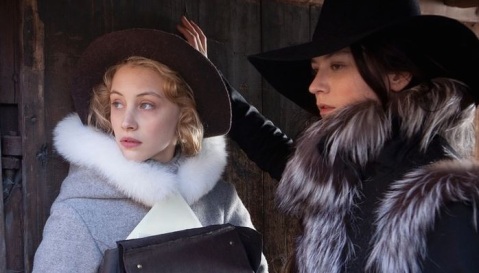 Amid the Catholic-Protestant conflict raging throughout 17th century Europe, Kristina (Malin Buska), only child of the late King Gustav II of Sweden, is raised under the watchful eyes of Sweden’s Lutheran court and it’s chancellor, Axel Oxenstierna (Michael Nyqvist). However, when Kristina comes of age and begins to rule as queen, her* radical proclamations and unconventional conduct in private cause tensions within the court.
Amid the Catholic-Protestant conflict raging throughout 17th century Europe, Kristina (Malin Buska), only child of the late King Gustav II of Sweden, is raised under the watchful eyes of Sweden’s Lutheran court and it’s chancellor, Axel Oxenstierna (Michael Nyqvist). However, when Kristina comes of age and begins to rule as queen, her* radical proclamations and unconventional conduct in private cause tensions within the court.
A Sweden-Canada co-production, The Girl King is a valiant if ultimately flawed attempt to illustrate the life of an extremely unusual monarch. Buska, already a well-known theatrical actress in Sweden, is a perfect choice for the intelligent and rakish Kristina, and is a commanding screen presence. However, one can’t help wonder if she is being held back slightly by the requirements of performing in a second language (other than the occasional exchange in French, the film is spoken in English), as her delivery of the lines doesn’t quite equal the exquisite subtlety of her facial expressions. Michael Nyqvist (known for the Swedish Girl With the Dragon Tattoo trilogy) does admirable work here as Sweden’s Chancellor, showing a surprising deftness in the more comic moments. The exchanges between Axel and Kristina, particularly when he is trying to delicately approach the subject of her tomboyish nature, are some of the best scenes in the film. Other highlights are Sarah Gadon as Kristina’s love interest, Countess Ebba Sparre, and Patrick Bauchau as the French philosopher René Descartes, with whom Kristina strikes up a correspondence which scandalises the pious members of her court (while Sweden and France had a mutual enemy in Germany, France’s allegiance to the Pope made their truce an uneasy one).
Despite the quality of the acting and some clever cinematography courtesy of Guy Dufaux, The Girl King ultimately feels a little ramshackle. Bouchard’s screenplay makes much of Kristina’s love for Ebba, and while it’s refreshing to see such an unapologetically queer historical figure pursuing their desires, the arc of Kristina and Ebba’s romance feels clichéd and despite an elegant turn from Gadon as a character Ebba is paper-thin. Indeed, even Kristina’s crisis of faith- surely hugely important for her as a character- feels glossed over here, and this lack of achievement of the script in really getting under her skin leaves the whole piece feeling too light. This, coupled with the slightly uneven tone where moments of high camp sit uncomfortably next to overwrought emotional scenes, serves to eject the audience from the narrative. A few moments of sloppy editing further underscore these problems.
All in all The Girl King feels like a film which is punching below its weight somewhat. However, there is still much to like here, particularly given the dearth of LGBT historical figures represented on screen. The narrative holds together well enough to showcase the film’s stronger components, and if this is Malin Buska’s Hollywood calling card she will certainly be one to watch in the future.
Verdict: 3/5
BFI Flare is the British Film Institute’s annual LGBT film festival in London. More information about the festival can be found here.
*A note on pronouns: in terms of the historical record, there seems to be a fair amount of debate between academics over both Kristina’s gender and sexuality, with varied theories suggesting Kristina may have been any one of what we now know as gay, bisexual, transgender or intersex. As there is little historical consensus on this, and as the film portrays her fairly unwaveringly as a cis lesbian, I have used female pronouns in my review. If this is a problem let me know and I can edit to gender neutral. Many thanks to my historian friend Katie for doing some academic investigation into Kristina’s history.
Image credit: facebook.com/TheGirlKingFilm
Hail, Caesar! Review
A Serious Mannix
Released : March 4th 2016
Certificate : 12A
Director : Ethan Cohen, Joel Cohen
Cast : Josh Brolin, George Clooney, Alden Ehrenreich, Scarlett Johansson, Channing Tatum, Ralph Fiennes
Plot : In 1950’s America, Capitol Pictures is one of the largest production companies in the world, and at the centre of its running is Eddie Mannix (Brolin). While working on the company’s biggest release of the year, Hail, Caesar! the lead actor, Baird Whitlock (Clooney) is kidnapped and held for $100,000.
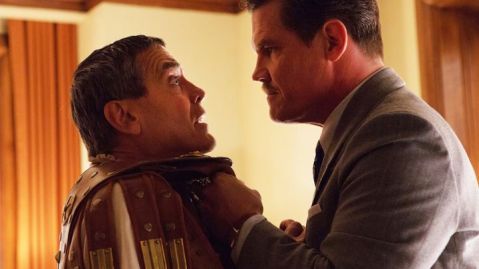
Another Coen brothers come around, this time the duo share the directing load, an emerging pattern, as Ethan has been only officially credited with co-directing Inside Llewyn Davis, A Serious Man, Burn After Reading, No Country for Old Men and The Ladykillers. Returning to lead their film is Josh Brolin and creating a hatrick for Clooney with the Coen Brothers. To use Coen terminology, Hail, Caesar! is definitely a toned down Burn After Reading as far as tone or vibe is concerned. So expect quirky humour in abundnace, as for this film the Coens have really let their hair down to fool around with their comedy still, retaining the surreal but losing the blunt violent nature they can pack. And along they way they pay homage to the 50’s cinematic scene, bursting with reference to the golden days of Hollywood that only the biggest of cinema geeks will notice all, but some are plainly there. So we interrupt this review to present the list of all reference that you can see in the trailer (to avoid spoilers), remember on what source you check these results may vary, but here are the references for those who didn’t pick up on them or are curious before seeing the film. Only the names will be given, allowing you to do your own research, and if the character’s name is the same as the real life person, they will not feature (e.g. Tilda Swinton and Josh Brolin character).
Hail, Caesar! (the fictions film within this film) is Ben-Hur. Scarlet Johansson’s character is an on screen (and possible off) impersonation of Esther Williams, with a scene from the film Million Dollar Mermaid recreated but from the view of shooting it. Tatum alike Johansson’s recreates Gene Kelly, specifically within On The Town, not as scene for scene as MDM. Ralph Fiennes plays George Cukor, who struggles with a Roy Rogers alike character played by Ehrenreich. George Clooney’s character has more debate around, but many seem to think its a summary of numerous actors of that time, but Charlton Heston and Cary Grant stand out. And the mighty capital pictures are MGM productions.
Straight away from the presence of such obscure, apart from Ben-Hur, reference’s within the film can give an insight as to the vibe of the rest of the film, which is essentially that the Coens do not care or make films for a large audience. As such the humour, and overall story line may either go straight over the heads of audience members or not be fully grounded.
As to direct the direction of the film (leaving the substance of the film for last due to its polysemic nature) is pitch perfect in accompanying the mood of each scene they are trying to achieve, making for great comedy directing that isn’t present much recently in the genre, which is the director doing hardly anything outside of relying on dialogue or on screen action codes, making directing creativeness less of a priority. It was refreshing excellent to see the Coen’s do the very opposite of this genre stagnation, as they did in Burn After Reading, however, due to the quirky nature of the humour, the directing ‘play’ that is present may be lost in audiences and possible critics disappointment as to nature of humour in comparisons to previous works. These directing techniques are in a way alike the scenes from previous films that are recreated, in the sense that they are conventionally reminiscent. Most obviously with the revealing of the villains obscured shot through a door from high angle and shadows used to blot our a character face. As well as this their own brilliant presentation of the quirky scenes, which are impeccable personified to create character driven humour. Joined with this is the entertainment recreation of obscure, all be it brilliant past film scenes.
As for the acting of the film, either by the Coen’s advice giving, or the actors own intuition, each actor presents his character with the correct degree of satire. Again to use Coen’s terminology, the character are more Fargo than No Country for Old Men, meaning that any depth or realism that the characters have is done so humorously, these are characters made to serve the vibe of the story and period place. Just as like the minor characters of Fargo all are cookie cut to help build the stereotypical polite Canadian representation. The characters of Hail, Casear! may not be quiet the comedic quality of Fargo, but there is a point where quantity overcomes quality, as the number of crazy Hollywood stooges in the film make it full enough of comically flawed characters. This helps with both the humour of the film and also for the recreation of past films. To pick out favourites would have to be Alden Ehrenreich for his portrayal of dimwitted low quality western actor in over his head in a serious drama and George Clooney for his third embodiment of a Coen comedic character which expertly captures the atmosphere that the Coens are going for, making him a truly valuable and cemented collaborator.
Overall, for the final use of Coen terminology, Hail,Caesar! is most similar to A Serious Man, in both undeniable odd nature and humour style. As A Serious Man, was a Marmite film among both critics and audiences (with some even calling ASM a modern classic) this film will likely do the same, not quiet to the same level as it lacking in the hidden meaning that ASM did. But for all the critical and high brow attention and expectation that may come with a new Coen Brothers release, this is another outing of them having silly fun, but hell it is fun.
Verdict : Its will be a hit and miss among fans of the Coens, critics and causal cinema goers alike. But the humour that is attempted to be created here is done perfectly and creatively, while many may not get all the jokes. And the reconstructions are a nice treat too.
Verdict : 4/5
Quote : “Would that it were so simple.”
Bridge of Spies Review
Saving Private Rylance
Released : December 26th 2015
Certificate : 12A
Director : Steven Spielberg
Cast : Tom Hanks, Mark Rylance, Amy Ryan, Billy Magnussen, Austin Stowell, Sebastian Koch
Plot : During the Cold War, Russian spy Rudolf Abel (Rylance) is arrested by the american government. In an attempt to give him the appearance of a fair trial, James Donovan (Hanks) is assigned to defend him. Matters are complicated when american pilot Francis Gary Powers (Stowell) is shot down and captured by the Russians.
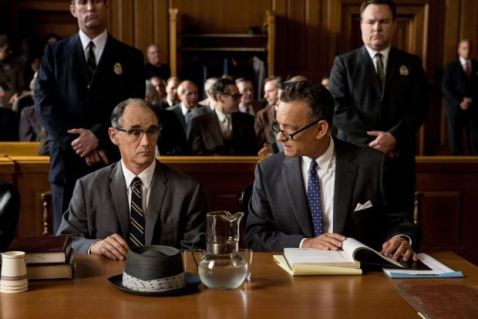
Yet another leading film this award session, and as time passes, predictions can quiet easily be made about the Oscars with the influence of the passing two award ceremonies. The award this film acquired at the recent BAFTA’s was that of best supporting actor to Mark Rylance (awarded before I saw the film) for his portrayal of Russian spy Rudolf Abel who seems surprisingly calm during his trial. The film also brings Steven Spielberg back to into award nominations, with last entry being Lincoln. A general critical response seems to be that we can be inclined to take such well-established directors work for granted. And that Bridge of Spies has reminded us of his skill of the craft, which we still need to appreciate, even with a routine fourteen academy award nominations, winning three of these. A true Meryl Streep of the directing world. And Bridge of Spies partners him again with Tom Hanks in a film studying patriotism, justice and humanity. But a less talked about and my surprising aspect of the film is that of the involvement of the Coen brothers. They being the two who wrote the films original screenplay, adding to the films nomination categories.
As far as this writing and the story it creates, it results in very classical cinema. This isn’t using the term in relation to it being of a very high standard, but rather due to its attitude to subject matter. With a plot with little morality to divide (as most war film do divide) and minimal character development, but furthermore the tendency to dramatics (overly for some) topics of patriotism and justice. It gives the film a squarer and more ununique take, with vibes relying on drama as seen before in Stevens films such as Lincoln and War Horse. This does makes the film perfect material for Steven to create specific atmospheres, but there is lack of capitalisation in some areas of the film. It is a surprising screenplay to come from the Coens, and it very much has a sole purpose in the narrative meaning, lucky that meaning will be a crowd pleasure. The film will leave audience happy as it’s a punch the air tale about doing the right thing. But Steven could have capitalised more on the tension particularly within the climax of the film, tension being a different atmosphere to drama. As an audience member there was little doubt in my mind that their would be a happy ending, the film could have attempted to sway audience more.
Steven however is masterful at building and instilling the warm message the film has into the cold world of Berlin, and immersing the audience into that world. While the film won’t generate relatability with the population of america, but Steven does manage to construct great work within Berlin, showing off his scene management with panning shots down along the building of the Berlin wall being noteworthy. Another effect which was refreshing to see again is his ability to manage action sequence, which was lacking in his recent instalments. Despite it being just one scene of a plain crash, it looks stunning and worth several of many other films action scenes. This along with other subtle effects, despite the films reliance on dialogue (always difficult to add to directing wise), shows Steven great skill. Not necessarily for new shots or for atmospherical creation, and other aspects like the obvious choices to construct certain scenes is probably the main reason why he will be missing out for the directing award nomination, doesn’t make his work any less tasteful. To conclude on Steven’s contribution, this film feels very much like a perfection of his art form of the good willed dramatic war story, varnished over War Horse and Lincoln.
Now to address the acting, which this side of the film is carried by Hanks and Rylance. This doesn’t imply that there isn’t other acting talent involved, but the other characters feel more 2D and serve to compliment the works of Hanks and Rylance. Gaining higher status with a brilliant performance in Wolf Hall after a career devoted mostly to stage, he follows it with a minor role in The Gunman and now this, earning him his first film acting award. This was a dark horse for many of the awards session due to the fact that in comparison it is the most subtle performance probably across all acting categories. This due to the characters lack of extreme emotion displayed or inner conflict within the character, this is a performance gaining praise solely through conviction and believability and rightfully so. While Stallone might still be the favourite, the acting in the sporting role categories is looking the hardest to call at this point. As Rylance differed himself from Hanks in this film via the pure deliverer of lines, Hanks to a degree still felt scripted, while Rylance didn’t. In many ways the end goal of an acting, to distinguish a script within a genuine character.
Bridge of Spies doesn’t bring anything new to the table within its genre, story or directing. But all long with the acting are executed to such a fine quality that it doesn’t matter. It is without a doubt that many may watch B of S and find it to be rather cliché in scenes that attempted to be more poignant than they are (the hyperbole reaction of the american government and people being a main one), but its impossible not to enjoy this film good natured tale. This being a tale fuelled with talent across the board as far as writing, directing and acting meaning that these cliché frameworks are more than welcome on screen within such good hands. Another brilliant and memorable collaboration between Hanks and Spielberg in a film with style and motive no stranger to either, but lucky the quality outshines any repetitiveness. S of B is well written, brilliant directed and superbly acting (thanks to Rylance), but in a year of unique cinema, only one Oscar is likely for this film.
Verdict : Steven has created his most enjoyable film since Catch Me If You Can, while the film could have had a different vibe within another directors hands, Steven’s were good enough. Rylance now has a career in film as a true character actor.
Verdict : 4/5
Quote : “And don’t nod at me like that you son of a bitch.”
Review: The Hateful Eight
Year: 2015
Certificate: 18
Director: Quentin Tarentino
Screenwriter: Quentin Tarentino
Cast: Samuel L Jackson, Kurt Russell, Jennifer Jason Leigh, Walton Goggins, Tim Roth, Demian Bichir, Michael Madsen, Bruce Dern
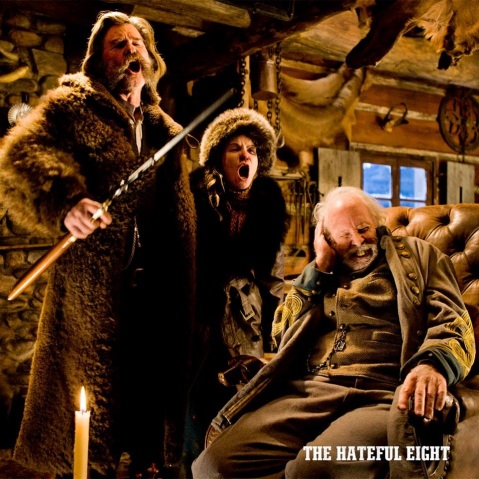
Tarentino returns for his (arguably) eighth feature with a frost-bitten tale of treachery in the outback of post-civil war Wyoming. Bounty hunter John ‘the hangman’ Ruth (Kurt Russell) is on the way to deliver captive outlaw Daisy Domergue (Jennifer Jason Leigh) to Red Rock for the pleasure of watching her hang when the arrival of a blizzard forces his stagecoach to spend the night at Minnie’s Haberdashery en route. Cooped up together under trying circumstances, suspicions begin to run rife between the Haberdashery’s incumbents. Is Chris Mannix (Walton Goggins) really the new sheriff of Red Rock? Why is Domergue so blasé about her situation? And- since this is Minnie’s Haberdashery- just where, exactly, is Minnie?
Tarentino’s trademark fondness for loquacious exuberance shines through, and the dramatis personae is littered with raconteurs who, by and large, feel well-realised and (although they are indeed as hateful as the title suggests) are entertaining to watch. This character-based drama drives the narrative until the splashy final half when everything goes to hell in a tainted coffee tin and the bullets (and viscera) begin to fly in typically hyperbolic style. The cast go all-in, with Samuel L Jackson putting in a commanding performance as Major Marquis Warren, a Union soldier turned bounty hunter who, facing a room partially populated by ex-confederate racists, is determined to give as good as he gets. Jennifer Jason Leigh is also mesmerising as the delightfully despicable Daisy Domergue, her scenery-chewing antics contrasting well with Kurt Russel’s perennially wry John Ruth, to whom she spends most of the film handcuffed.
Although the language and violence is unarguably gratuitous and the film is perhaps a little baggy at just under 3 hours, The Hateful Eight is a surprisingly coherent and entertaining piece featuring a well-told story and exciting performances.
Verdict: 4/5
Image credit: facebook.com/thehatefuleightmovie
The Revenant Review
The Good, The Bear and The Ugly
Released : January 15th 2016
Certificate : 15
Director : Alejandro González Iñárritu
Cast : Leonardo Dicaprio, Tom Hardy, Will Poulter, Domhnall Gleeson, Paul Anderson, Forrest Goodluck
Plot : A hunting party, guided by Hugh Glass (Dicaprio) and his son (Goodluck), are met with hostility by the indigenous tribe. Whilst running for their lives the party is slowed down by the severe injury’s of Glass after a bear attack. This strikes debate amongst the party as the native tribe slowly catches up.
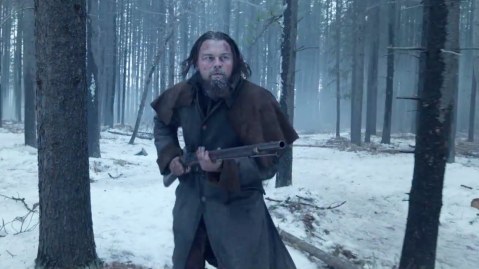 As the BAFTA’s loom, British audience get a chance to pass judgement on Alejandro González Iñárritu new western, and with all the nomination indicating that this film will be giving him the best director Oscar for two years in a row. When films are formulaically released at such a time as January award season in an attempt for the films to be fresh in the minds of the academy in order to better chances of getting to votes, it does mean that British cinema goers get a late verdict. Meaning as the Golden Globes take place and the nominations pour in, the British cinema fanatic will know who much every critic and academy members like the film before viewing. As such a majority of British viewer will see The Revenant with the knowledge that it has gain several awards as well as 12 Oscar nominations, a factor that will undoubtedly be in the minds of every viewer and can have one of two effects. The average man expects to see the best film ever and is disappointed leading to great distaste for film, or peoples pleasure is matched by their hype claiming it a new favourite. Either way the result is an extreme.
As the BAFTA’s loom, British audience get a chance to pass judgement on Alejandro González Iñárritu new western, and with all the nomination indicating that this film will be giving him the best director Oscar for two years in a row. When films are formulaically released at such a time as January award season in an attempt for the films to be fresh in the minds of the academy in order to better chances of getting to votes, it does mean that British cinema goers get a late verdict. Meaning as the Golden Globes take place and the nominations pour in, the British cinema fanatic will know who much every critic and academy members like the film before viewing. As such a majority of British viewer will see The Revenant with the knowledge that it has gain several awards as well as 12 Oscar nominations, a factor that will undoubtedly be in the minds of every viewer and can have one of two effects. The average man expects to see the best film ever and is disappointed leading to great distaste for film, or peoples pleasure is matched by their hype claiming it a new favourite. Either way the result is an extreme.
Straight off the bat The Revenant isn’t a film with a base story line that is revolutionary of the genre, it’s a simple revenge film, which has gained its praise via its execution. The films structure outside of execution and construction isn’t anything to write home about, neither are the characters that complex or individual. Tom Hardy’s Oscar nominated role for example is a true bad to the bone baddie. He possess very little aspects that we will related to due to his total distasteful nature and evil plotting, the same truth apply for the most part for the other character and story dynamic. But for this reason it means that when a story such as The Revenant is handled by such experienced and naturally talented people, it means these simple blocks can be placed together perfectly to create a masterpiece. This doesn’t imply that anyone can make a great film out of basic characters and story premises, but what it does mean is that people of such a high caliber have an ability to really excel, resulting in surprising twists to the genre and great execution such as profound emotional impact in scenes as well as the unique brilliant cinematography.
Without a doubt the runaway selling point of the film is the direction from Alejandro Iñárritu, who surprisingly had never filmed a horse before in his career until The Revenant, and yet he was able to build scenes of stunning nature an arsenal of components. Dealing with bear attacks, large scale battles, horse cashes, show downs, character drama (something he had already perfected in Birdman) all while capturing and dealing with the sprawling Canadian landscape. Each scene of the film is captured in such a unique visually ‘tasteful’ way that every sequence feels authentic and beautiful, overcoming the challenge of pacing that many two and a half film. But it is clear to see that the films long nature and wholly artistic approach to filming means that it won’t please the widest of audiences, if people are contempt with long scenes absent of dialogue and entertainment that is purely directorial, than there isn’t an issue. But every audience member won’t be able to deny the absolute visual ‘joy’ of some of the shots. To pick an obvious example, the bear attack in this, which is teased within the trailer, is like the Saving Private Ryan beach landing scene of animal attacks in films. In short breathtaking.
To address the acting side of the film, there will be much attention directed towards Dicaprio due to the hype at the idea of him finally winning an Oscar, but there needs to be hats taken off to some of the supporting cast. Will Poulter and Domhnall Gleeson turned out brilliant supportive roles, Poulter as the young lad of the hunting party well out of his depth morally and physically and Glesson as the rather weak captain attempting to keep his crew in line and focused. Both of there best scenes being the one revolving around just them, the fact that it was noticeable alongside Hardy and Dicaprio can stand as a testament to their growing skill. If there was an Oscar for best newcomer/best overall year for an actor, Glesson would be a main contender for it. Tom Hardy has as well gone from strength to strength since 2011 to become one of the definitive actors of this decade, typified with his role in The Revenant as a bad guy that isn’t his more interesting character, but delivered with such believable nature, conviction and ease it is well deserving of the Oscar nomination it has received.
And the frosting on this cake is of course the main man Dicaprio, as he turns out his third Oscar worthy role of the decade (with Mr Candie deserving an nomination as much as Waltz deserved to win). Probably not the role he will be remembered for due to the films lack of ‘fun’ in comparison to others, but due to the skill that is demanded of the role it’s his biggest piece of Oscar bait ever. This being due to the roles duties such as conveying emotion while seeming on the edge of death, telling a story with just facial expression (due to lack of dialogue) and its always a bonus to throw in a foreign language for good measure (as speaking native American to his son). As well as these star performances it would be a crime not to mention the work of Emmanuel Lubezki as cinematographer, who is in serious danger of winning his third academy award with this film, if it wasn’t impressive enough that he this year is his 8th Oscar nomination within his career.
Verdict : The Revenant offers perfection in fields of acting, cinematography and especially directing. Some might find it too focused on its artistic nature, or find little metaphorical meaning behind Iñárritu shot chooses, but its all done for the sake of beauty. As MGM production say in their slogan, “Ars Gratia Artis”, meaning “Art for Arts Sake”.
Verdict : 5/5
Quote : “If you look at its branches, you swear it will fall. But if you watch the trunk, you will see its stability.”
Review: Carol
Year: 2015
Certificate: 15
Director: Todd Haynes
Screenwriter: Phyllis Nagy
Cast: Cate Blanchett, Rooney Mara, Sarah Paulson, Kyle Chandler, Jake Lacy
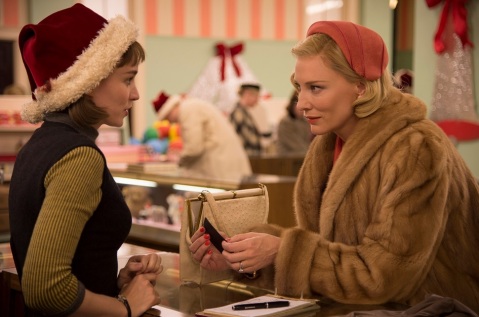
In 1950s New York a chance meeting between wealthy socialite Carol Aird and young department store clerk Therese Belivet quickly leads to a tentative romance. However, they must weather both the homophobic moral code of the era and the threats of Carol’s jealous ex-husband Harge if their relationship is ever to blossom.
Although at the surface langorous and dreamlike, Todd Haynes film still manages to offer a sharp commentary on the nature of attraction, love and jealousy and the rules by which lovers are bound. Carol and Therese’s courtship is one of bland conversation contrasted with questing, significant glances, neither woman being able to say (at first) exactly what they mean as it is not only socially forbidden but, one senses, emotionally too raw. Carol’s apparently offhand request for Therese to come and visit her betrays her longing and her loneliness as they sip soup in a dingy but opulent restaurant, while then tension hums between them.
Blanchett and Mara’s irresistible performances are at the centre of the film, and both actors are skilled enough to interpret the subtleties of Phyllis Nagy’s screenplay. By nature some of Carol and Therese’s conversation is opaque, but the leads, and Todd Hayne’s elegant direction, mean the audience understands exactly as much as they are intended to. Blanchett is fantastic as Carol, a woman torn between providing a social performance in order to hold on to her lifestyle and- more crucially- custody of her daughter and giving in to a new and powerful romance. In their initial meetings, the wonder and curiosity with which she gazes at Therese is tinted with something not unlike fear, even as she confidently invites Therese to her home. Mara brings the same intelligence and intensity as she did in Fincher’s Girl With the Dragon Tattoo, here similarly crafting a rich and believable identity from a character of few words. The dichotomy between Therese’s dawning awareness that for the first time in her life she has found something she wants and cannot live without, and her realisation in turn that this thing is riddled with complexity, is evident in every furrow of her brow and every straying of her eyes away from Carol’s to the floor or the window. Their early courtship is a cautious exchange of tentative admissions and stolen glances, and this sense of furtiveness, of not quite being able to believe what has just landed in front of them (as Carol says ‘such a strange girl… flung from space’) is borne out by Haynes’ and cinematographer Edward Lachman’s extensive and beguiling use of mirrors and windows. Like a kind of inverse medusa legend, their approach must be oblique for fear that the intensity of this thing that the language and culture of the time scarcely gives them words to describe will overcome both of them.
The supporting cast do much to flesh out and support the plot, providing alternate lenses through which the audience can view Carol and Therese. Sarah Paulson is fabulous as always as Carol’s longtime friend and ex-lover Abby, and Kyle Chandler brings humanity to Carol’s husband Harge who, while he understands that their marriage does not work, cannot quite let Carol go. It is to both Nagy and Haynes’ credit that Harge, while clearly the antagonist of the piece, is allowed to be three-dimensional and even engender a degree of sympathy even as his actions are clearly condemnable.
The considerable skill of the actors is bolstered by the other elements of the production, with Carter Burwell’s stirring score describing the action perfectly. The precise and delicate costume and set design both serves to anchor the film firmly in its 1950s setting but also somehow to enhance the sense of constriction felt by the characters in the roles that they have been forced by society to play. The slightly grainy filters, warm light and intense colour palette give the setting a vibrancy at the same time as bringing a slightly dreamlike quality to it, blending perfectly with the heady nature of Carol and Therese’s affair. High drama, but never slipping into melodrama, Carol is a soaring and beautifully made romance that will hopefully be regarded as a classic for years to come.
Verdict: 5/5
Image credit: carolfilm.co.uk
Review: The Falling
Released: 24th April
Certificate: 15
Director: Carol Morley
Screenwriter: Carol Morley
Cast: Maisie Williams, Florence Pugh, Maxine Peake, Greta Saatchi, Monica Dolan, Joe Cole
Set in a 1960s girls’ school, Carol Morley’s second feature film uses an outbreak of a mysterious fainting sickness to delve into issues of friendship, desire and self-examination. Teenage protagonist Lydia (Maisie Williams), is infatuated with her best friend Abbie (Florence Pugh), and terrified that their relationship will change in the wake of Abbie’s burgeoning sexuality and flirtation with Lydia’s older brother, Kenneth (Joe Cole). When Abbie is the first to fall victim to the epidemic of fainting, and Lydia finds herself succumbing, their group of friends must struggle to make sense of their symptoms in the face of impassive staff and a sceptical medical profession.
Strange and sensual, The Falling can be read in many different ways, and Morley skilfully maintains an ambiguity throughout. Florence Pugh’s otherworldly vocals in the film’s opening seconds feel almost like an incantation- a call to enter the dreamlike sphere of The Falling’s influence. This is continued as the ethereal piece played by the Alternative School Orchestra (Lydia and her core group of friends) is subsumed into Tracey Thorn’s score as the mysterious illness begins to manifest. The symptoms of the sickness itself- nausea, shaking, and almost balletic dyskinesias which give way to fainting- are excellently choreographed by Morley. If misdirected, the sight of mass swooning could easily look comical which, considering it happens time and time again in the film, would have rendered the whole thing a farce. Fortunately, the attacks are as disturbing as they are poetic, appearing equal parts agony and sweet surrender, particularly in one extraordinary sequence in which the whole school suffers a mass faint in assembly. This isn’t the only neat narrative trick, and despite the otherworldly nature of the story, Morley perfectly captures many of the fundamental constants of adolescence (and indeed life), from the frank intimacy of teenage friendships to the queasy humour that often pops up when facing horrific circumstances. The use of almost subliminally quick flashed images, both as part of larger montages and singularly in individual scenes, is powerfully evocative of how emotions and memories may flash unbidden to the surface.
How these memories are dealt with varies between cast members, whether it’s with teacher Miss Mantel (Greta Saatchi) and Miss Charron’s (Morfydd Clark) mutual support for one another, Miss Mantel’s restrained camaraderie with chainsmoking headmistress Miss Alvaro (Monica Dolan), Lydia and Abbie’s easy physicality or, more disturbingly, Abbie’s mother’s (Maxine Peake) complete withdrawal, and Abbie’s reflexive scorn. These myriad reactions highlight both the supportive and destructive nature of human relationships which, as the film progresses and tensions begin to mount, grow increasingly and oxymoronically intertwined. The cast rise admirably to the demands of the film’s complex characters, with Maisie Williams excelling in the lead role as the spiky Lydia, perfectly capturing her charisma and her vulnerability. Her performance is well complimented by Florence Pugh, and their raw dynamic anchors the first act. Maxine Peake brings depth to Lydia’s closed off and agoraphobic mother, Eileen.
Morley’s script is economical, making sure the dreamy intensity and at times ponderous ambiguity of the central occurrences don’t outstay their welcome. Although the pace perhaps slips at times in the final act as tension builds, the cathartic denouement more than lives up to the promise of the first two thirds. In The Falling, Morley and co. present a rich, compelling and provocative tale which stays with the viewer long after the credits have rolled.
Verdict: 5/5
Image credit: thefallingfilm.tumblr.com
Mini Review: Selma
Released: 6th February
Certificate: 12A
Director: Ava DuVernay
Screenwriter: Paul Webb
Cast: David Oyelowo, Tom Wilkinson, Cuba Gooding Jr., Carmen Ejogo, Lorraine Toussaint, Oprah Winfrey, Tim Roth
Director Ava DuVernay lends urgency to this Martin Luther King biopic focusing on the months leading up to the signing of the Voting Rights Act of 1965. King (David Oyelowo) and his organisation plan a march from Selma to Montgomery in Alabama to protest the entrenched racism preventing black people from voting in the US, despite them technically having the right to do so. Webb’s screenplay artfully illustrates the myriad tensions present in America at the time, and also within King’s organisation and his personal life, and the political conversations are both fascinating and illuminating. Oyelowo’s performance is extraordinary, showcasing both King’s superlative strengths and his very human weaknesses and doubts. The confrontations between King and Tom Wilkinson’s sympathetic but pragmatic President Johnson are particularly engaging, but all of the strong supporting cast bring gravity to the picture. DuVernay’s dynamic direction brings the drama to life, giving a sense of movement to the conversation-based scenes and shocking impact to the protest set-pieces. The knotty nature of the events in question at times means the pace slips slightly, and perhaps the film runs a little long. However, as a deft and complex portrait of an important historical figure and event told in a truly cinematic manner, Selma is an accomplished success.
Verdict: 4/5
Image credit: selmamovie.com
Review: Mr Turner
Released: 31st October
Certificate: 12A
Director: Mike Leigh
Screenwriter: Mike Leigh and cast
Cast: Timothy Spall, Dorothy Atkinson, Paul Jesson, Marion Bailey
Mike Leigh’s latest film follows the later life of 19th century painter JMW Turner (Timothy Spall), lauded as one of Britain’s greatest artists. Fittingly, it is no understatement to describe the film as a visual feast. This is not only in terms the works of art on show from Turner and his contemporaries, but also the sumptuous costumes and magnificent sets and locations. However to say the film is purely an aesthetic experience would be damning with faint praise; it is a lot more besides. Mr Turner wonderfully showcases Mike Leigh’s skill as a constructor of naturalistic and engaging social drama. The frequent tableau scenes between Turner and his many acquaintances are a delight to watch, whether they are as comedic as teatime in the parlour of the fatuous Ruskins or as fraught as the clash of artistic egos at the Royal Academy exhibition. At the centre of the film lies Timothy Spall’s performance, which is accomplished and compelling. He is able to encapsulate and indeed evoke the gamut of emotions from a laugh to a painful tug on the heartstrings merely by varying the cadence of his many ‘harrumphs’. His Turner is mercurial, mysterious, and utterly believable. The rest of the cast are also fantastic, particularly Dorothy Atkinson as Hannah Danby, Turner’s underappreciated housekeeper and occasional lover, and Paul Jesson as his put upon but uncomplaining father.
Leigh’s direction manages to be both cinematic and intimate depending on the demands of the scene. During a discussion in which the owner of a guest house reveals his regret over having been a builder of slave ships as a younger man the camera cleaves close to the actors’ faces, while elsewhere the camera is positioned behind Turner, as if all the world is merely a canvas he- and the audience- are looking out upon. Unfortunately, the spellbinding nature of the individual scenes is somewhat undermined by a lack of a clear overarching narrative, particularly in the third act. Leigh’s films are often loosely structured, and one can see why he wanted to avoid what can be the all too story driven nature of the traditional biopic, however the piece would have benefitted from a little more pace. Furthermore, although Leigh appears to be hinting at a connection between the complications and bereavements in Turner’s later life and the increasingly abstract nature of his paintings, this is not fully explored. Although we see a great number of Turner’s actions and emotions, his motivations remain frustratingly obscure.
Peppered with rich dialogue, wonderful settings and elevated by an extraordinary central performance, Mr Turner is a beautiful, albeit slow moving, film of wit, imagination and spirit.
Verdict: 4/5
Image credit: http://www.facebook.com/MrTurnerFilm
Recent Posts
Archives
- September 2017
- February 2017
- January 2017
- November 2016
- October 2016
- September 2016
- June 2016
- April 2016
- March 2016
- February 2016
- January 2016
- December 2015
- November 2015
- October 2015
- September 2015
- August 2015
- July 2015
- June 2015
- May 2015
- April 2015
- March 2015
- February 2015
- January 2015
- December 2014
- November 2014
- October 2014
- September 2014
- August 2014
- July 2014
- June 2014
- May 2014
- April 2014
- March 2014
- February 2014
- January 2014
- December 2013
- November 2013
- October 2013
Categories
- 1961
- 1982
- 1985
- 2010
- 2011
- 2012
- 2013
- 2014
- 2015
- 2016
- 2017
- 2D
- 3D
- Cinema
- Classic Reviews
- Collections
- DVD
- films
- Genre: action
- Genre: animation
- Genre: biopic
- Genre: comedy
- Genre: drama
- Genre: fantasy
- Genre: horror
- Genre: LGBTQ
- Genre: musical
- Genre: period drama
- Genre: sci-fi
- Genre: superheroes
- Genre: thriller
- Genre: western
- Netflix
- Preview Article
- Rating: 1/5
- Rating: 2/5
- Rating: 3/5
- Rating: 4/5
- Rating: 5/5
- Reviewed by: AES
- Reviewed by: SO
- Reviews
- Top 5 List
- Uncategorized
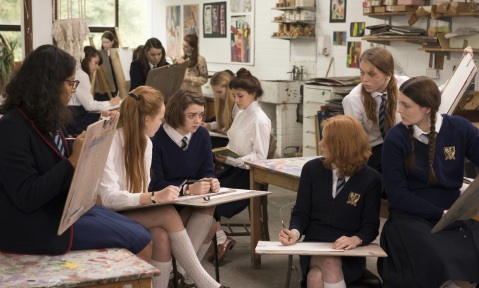
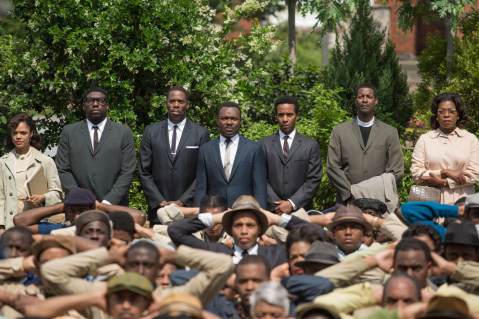

Recent Comments